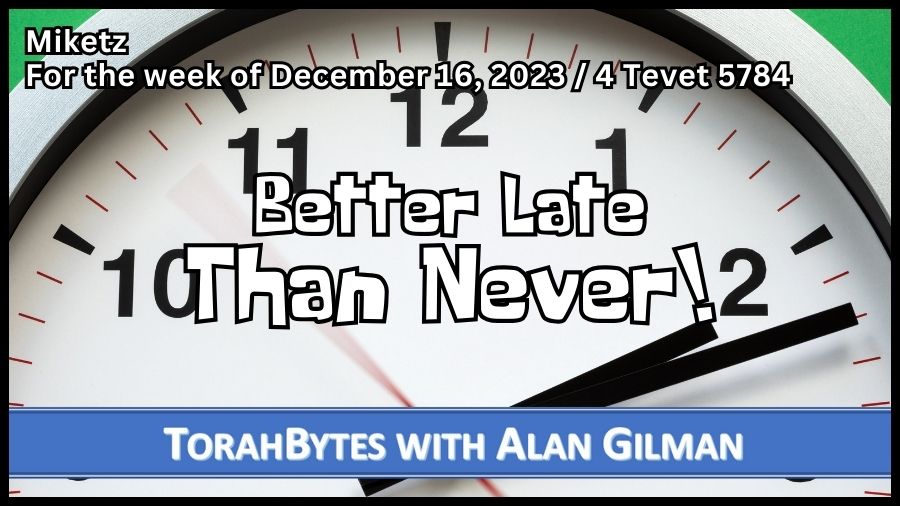For the week of December 16, 2023 / 4 Tevet 5784

Miketz
Torah: Bereshit/Genesis 41:1 – 44:17
Haftarah: 1 Melachim/1 Kings 3:15 – 4:1
Then the chief cupbearer said to Pharaoh, “I remember my offenses today.” (Bereshit/Genesis 41:9)
This message can literally change, not only your life, but the world! Am I exaggerating? I don’t think so. In fact, when this very thing happens, write me and tell me about it. Here goes…!
First, let’s set the scene. Pharoah, king of Egypt, had two disturbing dreams. They were of the kind that obviously meant something, but what they meant wasn’t clear. It bothered Pharoah to the point that he sent for “all the magicians of Egypt and all its wise men” (Bereshit/Genesis 41:8), but no one could tell him the meaning. That’s when his cupbearer spoke up and told him about Joseph. The cupbearer had been in the dungeon along with his baker colleague, when they each had dreams which Joseph, a fellow prisoner, had correctly interpreted. Just as Joseph predicted, the baker was executed, while the cupbearer was restored to his position. Prior to their release, Joseph asked the cupbearer to speak up on his behalf in the hopes that he too would finally get out of that horrible place. But even though Joseph’s interpretation was proven to be correct, the cupbearer neglected to say anything on Joseph’s behalf. We read:
[Pharoah] restored the chief cupbearer to his position, and he placed the cup in Pharaoh’s hand. But he hanged the chief baker, as Joseph had interpreted to them. Yet the chief cupbearer did not remember Joseph, but forgot him (Bereshit/Genesis 40:21-23).
Did the cupbearer forget Joseph or forget him, if you know what I mean. Did the thought of Joseph’s request completely vanish from the cupbearer’s mind or is this a way of expressing neglect? Perhaps someone has done a thorough study of the psychology of forgetting. Why do we remember some things and not others, even important things? However that works, it is possible that the word “forget” here is a way to indicate neglect rather than the complete loss of awareness of something. Of course, we may also use “forget” to purposely cover up (“lie about” in other words) something we don’t want to do.
Whatever the dynamics in the cupbearer’s case, in the context of Pharoah’s distress, he owned his forgetting by confessing that he failed to follow-up on Joseph’s request. I wonder why he admitted that he failed to do it. Apparently, this is something he thought he should have done at the time. Regardless, why didn’t he simply say that he knew a guy from his prison days who could interpret dreams?
Whatever his motive, how he says what he says reflects a sense of regret for not mentioning Joseph sooner. This suggests that his forgetting may have been due to some sort of purposeful neglect after all. Perhaps, he didn’t want to talk about his imprisonment. Maybe he didn’t like thinking about it, or he was afraid that bringing up whatever led to his imprisonment may stir the wrong people and get him in trouble again. It was a lot easier to forget everything about those days and enjoy his freedom, while innocent Joseph rotted in prison.
Whatever the reason for not speaking up sooner; whatever the reason for his apologetic confession, he did speak up. Would it not have been easier, after not saying anything for two years (see Bereshit/Genesis 41:1), to stay silent and let Pharoah get over it? Maybe Pharoah was making things really unpleasant for everyone around him, and that’s why the cupbearer was so apologetic when he did speak up.
Whatever the reason, he did speak up.
I wonder how many times in our lives we find ourselves in a situation where we realize we should have said or done something in the past, but for whatever reason, we didn’t. Now the opportunity to speak up or do what we should have done earlier presents itself again. Yet, the intimidation we feel from having to admit what we should have said or done prevents us from doing what we should say or do now. I am sorry for whatever it was that prevented you from making the needed difference at the time. I am also sorry for how uncomfortable you might feel now as you are faced with not only the challenge of whatever it is, but also having to own up to your past failure. But may I plead with you to consider how much the benefit of your contribution at this time is greater than the discomfort you may feel over it? It’s possible that others may not be happy with your past failure. Can you blame them? You aren’t. But think how much better off we’d all be if you would break through your fears and do what needs to be done. Better late than never.
Scriptures taken from the English Standard Version
Thank you for this reminder. I’d like to suggest that for those with a sensitive conscience, sometimes it may be shame that keeps us trapped in past failures. But the Lord is more than willing to set us free from shame and give us courage. God sees and knows. That is motivation enough to do the right thing when the opportunity presents itself, even if we previously failed to do it.